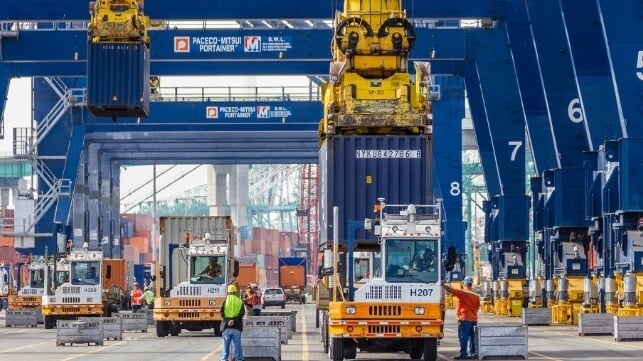Legislation Would Help Terminal Operators Buy Zero-Emission Cargo Equipment

A new bi-partisan bill was introduced in the U.S. House of Representatives designed to maximize investment in equipment and infrastructure used by the United States private marine terminal operators. The bill is designed to provide tax incentives that help support the terminals as they transition to lower-emission cargo handling equipment.
"Our legislation helps modernize the infrastructure at America's ports and harbors and strengthens our supply chains," said Congressman Mike Ezell of Mississippi who along with Congressman Troy Carter, Sr., of Louisiana are co-sponsoring the legislation. It specifically calls for expanding the Capital Construction Fund administered by the U.S. Maritime Administration (MARAD) to allow private marine terminal operators to use a tax-deferred account to purchase American-made cargo handling equipment.
The National Association of Waterfront Employers (NAWE) is supporting the legislation highlighting the critical need and costs private terminal operators will be facing in buying new near-zero and zero-emission cargo handling equipment. The trade association whose member companies are privately owned stevedores, marine terminal operators, and other waterfront-related employers, provided statements of support from its membership for the proposed legislation.
They point out that the terminal operators will require tens of billions of dollars in private capital to meet the pending requirements to reduce emissions from their operations. In addition to the required investments in new equipment, the association also highlights that the terminal operators will be required to prematurely retire existing, diesel-powered cargo handling equipment before the end of its expected life.
The Inflation Reduction Act created new Environmental Protection Agency programs to fund the purchase or installation of zero-emission cargo handling equipment, but it is largely only available to public port authorities or the state and regional, and local entities. NAWE highlights that a majority of the investments will be made by private marine terminal operators.
The legislation would make it possible for private terminal operators to defer tax on operational income and income from the sale of existing cargo handling equipment. The income would be deposited into a Capital Construction Fund approved by MARAD and could only be withdrawn on a tax-deferred basis for the purchase or construction of new cargo handling equipment. They point out that the bill does not include appropriation funds for the purchase of the equipment.
Last year, Congress expanded the use of Capital Construction Funds to make eligible the acquisition, construction, or reconstruction of vessels engaged in the U.S. coastwise trade, including all classes of vessels working in the domestic oil and gas industry and tugs and barges engaged in the transportation of U.S. agricultural cargoes on America’s inland waterways. The proposed legislative amendment, drafted in partnership with NAWE and its members, seeks to expand the program to include private marine terminal operators.

that matters most
Get the latest maritime news delivered to your inbox daily.
The bill’s sponsors said the change in the authorization would provide financial flexibility that will allow for the development and expansion of port infrastructure. The “Buy American” elements they said will also support the industry and create new jobs.
The legislation to add cargo handling equipment to the Capital Construction Fund program has been referred to the House Committee on Transportation and Infrastructure.
